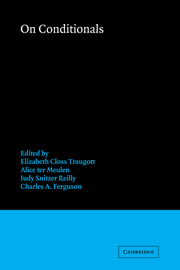2 - CONDITIONALS AND CONDITIONAL INFORMATION
Published online by Cambridge University Press: 04 August 2010
Summary
INTRODUCTION
For those of us involved in the attempt to spell out the relation between statements and those aspects of reality they are about, conditionals are a thorny issue. Within this semantic tradition, common wisdom can be summarized rather contentiously as follows: classical model theory gives us the semantics of the material conditional. It works fine for mathematical conditionals, but is a disaster if applied to ordinary language conditionals, especially counterf actual conditionals. Within the possible worlds framework, there are various treatments, some of which are quite successful for certain types of natural language conditionals, including counterfactuals, but they are all a disaster when applied to mathematical conditionals. I will give examples of both sorts of failures below.
My own opinion is at odds with this view of where things stand. I think that the language of mathematics is continuous with ordinary language, since discourse about mathematical objects and mathematical activity takes place in English or some other natural language. While it would not be appropriate to argue for this commonsensical but unfashionable position in this paper, it is appropriate to point out the consequences for a theory of conditionals. To one who takes this line, mathematical conditionals simply are natural language conditionals, so an adequate account of mathematical conditionals must be part and parcel of an adequate account of natural language conditionals. Hence, neither of the approaches to the conditionals mentioned above is at all satisfactory and the lack of an adequate account of the semantics of conditionals is a major embarrassment.
- Type
- Chapter
- Information
- On Conditionals , pp. 21 - 54Publisher: Cambridge University PressPrint publication year: 1986
- 21
- Cited by

